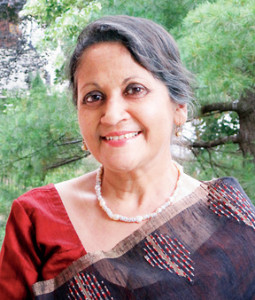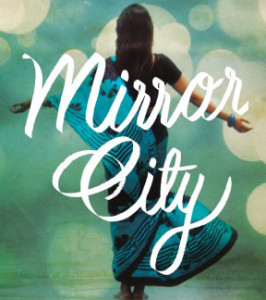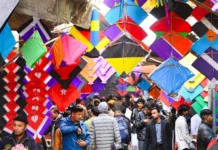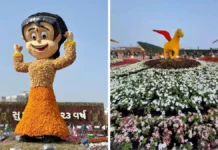
On the cover is a woman wrapped in turquoise saree, her hands splayed, her hair wavy, her feet bare. You cannot see the face; she seems floating in a green backdrop with what seems like neon bubbles. You know not her name yet, but you get a feel that she is reaching out to the sky, seeking freedom, walking alone towards her own self-discovery.
Mirror City, the book title is calligraphed in white. The author name in all capitals: CHITRITA BANERJI.
If you love the 18th century Baul saint, mystic Lalon Fakir, you’d know where the book title comes from – Lalon believed that in mirror cities lovers never meet. If you are a gourmand, foodie – even a glutton – you’d cook an image of Chitrita Banerji, the Calcutta-born, Massachusetts-resident food historian. Her first book was Bengali Cooking: Seasons and Festivals (1997), followed by Hour of the Goddess: Memories of Women, Food, and Ritual in Bengal (2007), and Eating India (2008).
These food books rustled rave reviews and a few awards. The Independent called Eating Out “a gem of a book that will reveal an unfamiliar world to the beginning epicure, whilst luring the more experienced into wondrous new adventures”, while Time Out London listed it among the best new food books of 2008. As a food historian, Banerji has presented papers at the Oxford Symposium of Food and Cookery where she twice won Sophie Coe Award in Food and History.
That’s Banerji, the food historian that bookworms know of and libraries catalogue. One look at the cover of Mirror City and you know Banerji is stepping out of the kitchen and taking her first step into a world of fiction. Mirror City is her first novel, which, as she admits in Acknowledgements, “has been more than ten years in the making. Frustration and interruptions have made the process more difficult”.

Before you flip open the first page, the back cover succinctly sums up the book. Daughter, wife, lover – her journey of self-discovery is just beginning. The story begins in 1973 when Uma, a Bengali from Calcutta, married to a Muslim from Bangladesh, moves with him to Dhaka. The newly independent nation is reeling under the scourge of political corruption, impending famine and the accompanying chaos of a new nation.
Within the anarchy of a nation as a backdrop, Uma’s marriage witnesses its first cracks and her story unfolds amidst deafening questions about their inter-religious marriage and the brutal reality of her husband being a changed man. Uma battles with harsh realities. She feels lonely and lost. And then the inevitable happens – an adulterous love affair turns her world upside down. Uma wrestles with her demons and fate. Between passion and loneliness, Uma seeks just one thing: Herself.
Published by Penguin Viking, this 399-page hardback (Price: Rs 499) is divided into five segments sequentially. Beginning with Encounters (September 1973-July 1975) and running through Upheaval, Illusion, Dissolution, the book ends with Passage (January 14, 1977). Within these, characters flit in and out, drama happens, passions flare up, tears flow, questions are asked, eyebrows raised, and the story straddles grey moments and gay abandon, sometimes with ease, sometimes tediously.
Somewhere in between Encounters and Passage, you find fiction borrowing from real life. Banerji grew up in Calcutta and then packed her bags to fly seven seas and study English literature in Harvard University. Like the protagonist Uma, Banerji spent seven years in Bangladesh and went through a similar rigmarole of living in a familiar, yet so unfamiliar, nation and culture where religion and class stratify not just societies but hearts as well. Banerji left East Bengal, kept flying between her native Calcutta and the United States. In 1990, she settled permanently in the US; she now lives in Cambridge, Massachusetts.
In real life, Banerji found her moorings. Was Uma’s fate similar? Did she find herself?
(www.deepblueink.com)
Preeti Verma Lal






